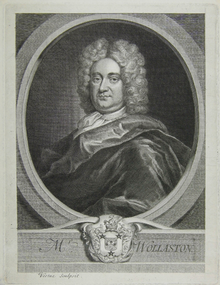Our website is made possible by displaying online advertisements to our visitors.
Please consider supporting us by disabling your ad blocker.
William Wollaston
William Wollaston | |
|---|---|
 | |
| Born | 26 March 1659 Coton-Clanford, Staffordshire, England |
| Died | 29 October 1724 (aged 65) London, England |
| Era | 18th-century philosophy |
| Region | Western philosophy |
| School | Enlightenment Rationalism |
Main interests | Ethics, philosophy of religion |
Notable ideas | Religion derived from adherence to truth[1] |
William Wollaston (/ˈwʊləstən/; 26 March 1659 – 29 October 1724) was an English school teacher, Church of England priest, scholar of Latin, Greek, and Hebrew, theologian, and a major Enlightenment era English philosopher. He is remembered today for one book, which he completed two years before his death: The Religion of Nature Delineated. He led a cloistered life, but in terms of eighteenth-century philosophy and the concept of natural religion, he is ranked with British Enlightenment philosophers such as Locke, Berkeley, and Hume.
Wollaston's work contributed to the development of two important intellectual schools: British Deism, and "the pursuit of happiness" moral philosophy of American Practical Idealism, a phrase which appears in the United States Declaration of Independence.
Previous Page Next Page


